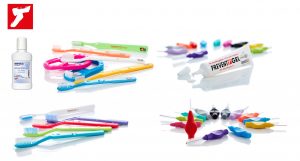Has sobriety really become cool? – Kimberley Lloyd- Rees Dental Hygienist and Therapist
Featured Products Promotional FeaturesPosted by: Dental Design 9th November 2019

 Did you keep those resolutions you made in January?
Did you keep those resolutions you made in January?
One pledge that lots of Brits did make was to review their relationship with alcohol. Dry January is now a powerful movement and 4.2 million people were planning to take part in 2019.[i] Many would also have seen one dry month as the impetus to cut down in the long-term; research from a previous year showed that 70 per cent of participants were still drinking less six months later.[ii]
Is a shift underway, or at least, beginning? Articles with titles like ‘How giving up alcohol changed my life’ are popping up all over the place. Often, they will describe the experience of a moderate drinker who, after stopping, gained more energy and a sense of wellbeing. Take a look on Instagram and you’ll find millions of posts under hashtags like #soberliving. Because it’s Instagram, these non-drinkers are almost overwhelmingly young and beautiful – no wonder, when a sober life also promises clear skin, weight loss and better sleep. Sobriety is now an aspiration!
Beyond the hashtags
It’s great that more people appreciate it’s possible to enjoy a great night out (or in) without alcohol. But we must not let this optimistic wave hide the fact that alcohol is a drug and a cheap, accessible one at that.
The latest figures for alcohol-specific deaths in the UK showed an upward trend after 2015, following a period of stability.[iii] In the UK, over 40 per cent of women continue drinking while pregnant, one of the worst rates in Europe (the advice from the Chief Medical Officer is not to drink at all when pregnant, or trying to conceive).[iv],[v] In 2017, per 100,000 males aged between 60 and 64, there were 40.6 alcohol-specific deaths.[vi] This is out of 7,697 alcohol-specific deaths for that year in total.
The problem is worse in certain areas of the UK, particularly in towns with increased social deprivation (although alcohol addiction can and does affect people with more disposable income too). Scotland has always had the highest rate of alcohol-related deaths and hospital admissions than the other countries in the UK and in 2017 the Scottish government introduced minimum unit pricing in a bid to counter the issue. The results appear to be promising – earlier this year it was reported that alcohol sales in Scotland fell to their lowest rate since 1994.[vii]
Tell your patients that, even if they don’t want to abstain completely, regularly reviewing how often – and how much – they drink and sticking to the guidelines will have enormous benefits. Regular overindulgence will affect physical and mental wellbeing and it’s no good for oral health either. A 2010 study found that the risk of mouth/pharynx cancers was around five times greater for people who had four or more alcoholic drinks a day, compared to those who are sober/drink occasionally.[viii] But regular moderate drinking, of just one alcoholic drink a day, also indicated an elevated risk.[ix] Combine alcohol with tobacco and they’ll increase their chances of getting oral cancer even further.[x]
Alcohol is full of sugar and can lead to a dry mouth and possibly halitosis. Some drinks can stain the teeth. On social occasions, alternating an alcoholic drink with a glass of still water is a good idea. Patients should also be cleaning their teeth and gums properly, twice a day, with high-quality tools, such as the TANDEX range, to remove optimal bacteria and to keep their mouth fresh, especially if they’ve been drinking.
A sober life is more regularly being described in euphoric terms, but there are patients (and practitioners!) who look forward to a glass of wine at the weekend. If a sober life isn’t for them, they should still be reminded of the importance of being sensible with alcohol. But if they stay within the limits – especially during the party season that is nearly upon us – they can enjoy a drink as part of a healthy lifestyle.
For more information on Tandex’s range of products,
visit www.tandex.dk or visit the Facebook page:
www.facebook.com/pages/Tandex-UK/234855250044190?fref=ts

Author:
Kimberley Lloyd- Rees graduated from the University of Sheffield in 2010, where she now works as a clinical tutor in Dental Hygiene and Therapy as well as working in practice. She has spent her career working across a variety of specialist private and mixed dental practices, for the MOD and volunteering her time to a dental charity in Nepal.
References
[i] Alcohol Change UK press release, December 2018. Link: https://alcoholchange.org.uk/blog/2018/news-release-4-2-million-people-in-the-uk-to-go-alcohol-free-for-dry-january-2019-for-healthier-drinking-year-round (accessed August 2019).
[ii] de Visser RO, Robinson E, Bond R. Voluntary temporary abstinence from alcohol during “Dry January” and subsequent alcohol use. Health Psychology. 2016 Mar; 35 (3) 281.
[iii] Office for National Statistics. Alcohol-specific deaths in the UK: registered in 2017. Latest release, published December 2018. Link: https://www.ons.gov.uk/peoplepopulationandcommunity/healthandsocialcare/causesofdeath/bulletins/alcoholrelateddeathsintheunitedkingdom/registeredin2017(accessed August 2019).
[iv] University of Hull, 4 January 2019. The problem of drinking in pregnancy and what to do about it. Link: https://www.hull.ac.uk/work-with-us/more/media-centre/news/2019/the-problem-of-drinking-in-pregnancy-and-what-to-do-about-it.aspx (accessed August 2019).
[v] NHS. Drinking alcohol while pregnant. Link: https://www.nhs.uk/conditions/pregnancy-and-baby/alcohol-medicines-drugs-pregnant/(accessed August 2019).
[vi] Office for National Statistics. Alcohol-specific deaths in the UK: registered in 2017.
[vii] Independent, 19 June 2019. Alcohol sales in Scotland hit 25-year low after minimum unit pricing introduced. Link: https://www.independent.co.uk/news/health/alcohol-scotland-deaths-buckfast-minimum-unit-price-record-low-england-wales-a8964011.html (accessed August 2019).
[viii] Drinkaware. Alcohol and oral cancer factsheet. Link: https://www.drinkaware.co.uk/alcohol-facts/health-effects-of-alcohol/diseases/alcohol-and-oral-cancer/ (accessed August 2019).
[ix] Drinkaware. Alcohol and oral cancer factsheet.
[x] Drinkaware. Alcohol and oral cancer factsheet.
No Comments
No comments yet.
Sorry, the comment form is closed at this time.



